Identity Personality Questionnaire
Personality Questionnaire Feedback Report – we continue with our series covering the five different reports available from Identity the BPS Accredited Personality Tool.
Recruitment | Selection | Development
THE FEEDBACK REPORT
The Benefits of Identity
Just to remind you of the benefits of using the Identity Personality Questionnaire:
- Well researched and validated tool
- No training needed as reports are interpreted
- Efficient and quick delivery of reports
- One questionnaire completion for comprehensive outputs
- Suitable for all levels within an organisation
- A range of user – friendly reports to meet all your needs
- Cost-effective solution
The Feedback Report
The Full Feedback Report is a report that can be used for many purposes to support understanding and on-going development. In recruitment situations this report is provided as a complimentary report with the Interview Report. The idea is that we like to encourage our clients to look after their candidates. The candidates have spent the time to complete the Identity questionnaire and therefore they should be provided with some useful feedback. Therefore, after selection decisions have been made, the Feedback Report can be emailed to the candidate. A candidate receiving this useful report will have better respect for the organisation, whether they were offered the job or not.
Understanding the Personality Profile
As the profile is presented quite early in the report, it is useful to understand the Identity Profile first. There are 4 sections:
- Red section is the Interpersonal i.e. their preferences in interacting with people.
- Blue section is Thinking i.e. their preferences with handling information and handling tasks.
- Green section is Internal i.e. their preferences for getting things done (Drivers) and their preferences around dealing with emotions.
- Yellow section is Style Scales. Here we have 4 style scales that help us understand the person better and also provides us with information to gauge how accurate the Profile is likely to be.
More information is provided later.
Understanding the Personality Scale
There are 36 personality scales.
The scale used is a 10 point scale where:
- 1 means extremely low preference and
- 10 means extremely high preference.
A description is provided at the two ends i.e. on the left and right of the profile. Please note: The scale is normally distributed. That means more people score in the middle between 4 and 7; and very few people will score at 1 or 10. In fact only about 2% of people will score on each of these extreme scores.
The Narrative Report
The narrative report provides feedback on the key Identity areas. Here is an example:
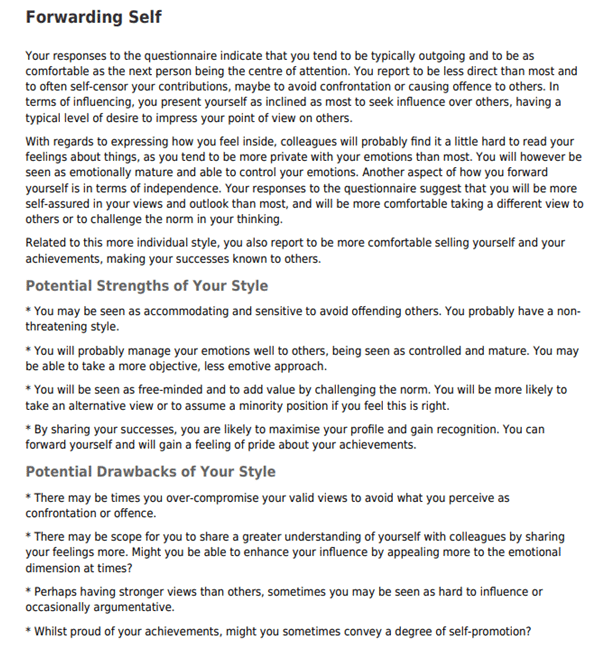
First, at the top, it provides a narrative for the area providing details of their scale preferences that load onto this area.
Then it provides useful bullet points of potential strengths, followed by potential drawbacks of their style. Providing both sides is extremely useful to support development.
The Narrative is provided for all six sections:
Red Section: Interpersonal
- Forwarding Self
- Focus on Others
Blue Section: Thinking
- Information
- Tasks
Green Section: Internal
- Drivers
- Emotions
The Candidate Feedback Report
A complementary Candidate Feedback Report is provided with the Interview Report so that candidates receive some feedback. This report is known as the short version of the Feedback Report. The report finishes after the Style Scale section. This version already has plenty of information that candidates can use. As most of these candidates will not have an opportunity to discuss their results then this is enough information for them, as sometimes too much information can be overwhelming.
Psychological Models
However, if the Feedback Report is being used to support development and there will be an opportunity to have a development discussion then the Identity Psychological Models can be added to this report. This then makes the report extremely versatile to support all possible purposes e.g. Team Development, Management Training, Coaching, Personal Development, etc,.
Identity has 5 Psychological Models:
- Leadership Preferences
- Team Profile
- Emotional Focus
- Learning Orientation
- Type Preferences
You can choose the models you want to include in your report to support your purpose.
Psychological Models
The Psychological models provide comprehensive information on the person’s preferences. Normally, it would require several questionnaires to be completed in order to gain so much useful information. But with Identity we can provide all this rich information from just one questionnaire completion, which typically only takes around 35 minutes to complete.
The psychological models are:
Leadership Preference: This presents a profile on four leadership preferences: Change, Participative, Controlling, and Networking.

Team Role Profile: This provides scores on 7 Team Roles and also a Flexibility score. This is useful in identifying the roles that the person is more suited to, and also identifies the roles that the person may be less suited to.
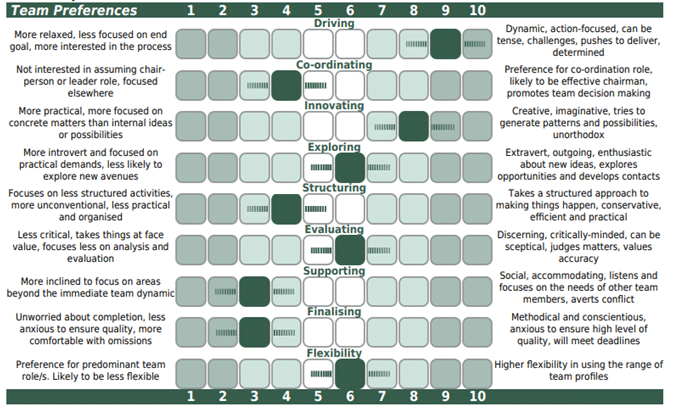
Emotional Focus: This provides information on Emotional Intelligence. The first section looks at understanding oneself i.e. Self Awareness, Managing Own Emotions, and Self Motivation. The second section looks at understanding others i.e. Social Awareness, Managing Other’s Emotions, and Social Motivation.
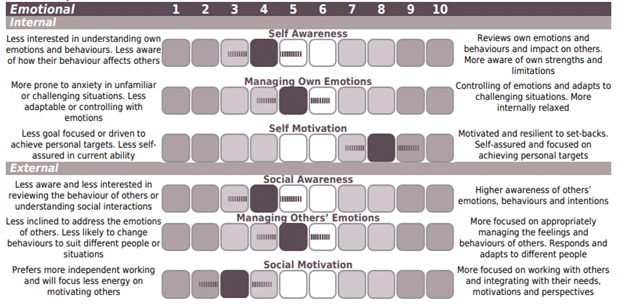
Learning Style: This provides useful insight on how we are all different in terms of the way we prefer to learn and also provides some information on whether we may be more right or left brain dominant.
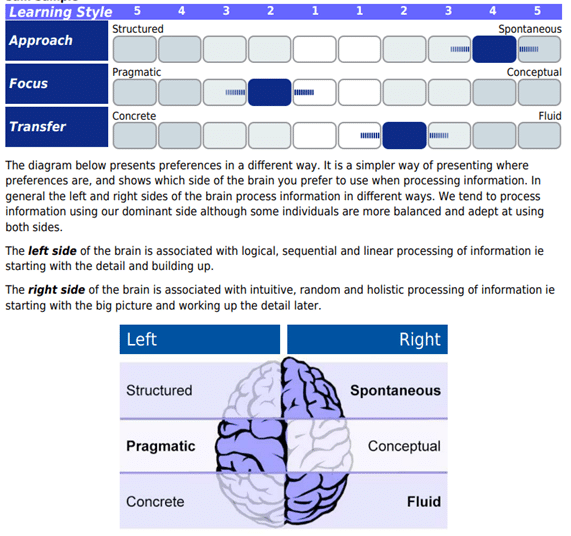
Type Preferences: This is based on Carl Jung’s Type research. The MBTI is the best known questionnaire. The Type model states that you will have a preferred type e.g. you are either an Extravert or Introvert. Actually, the scale is a continuous scale so you can sit in the middle – but it will still put you into one side.
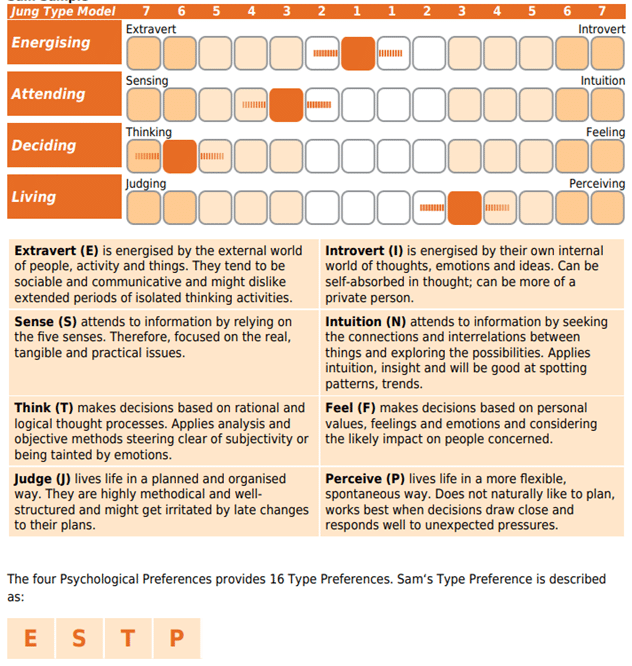
Therefore, you can appreciate that the full Talent Report provides a comprehensive range of very useful information for an individual. HR professionals, coaches, mentors, and line-managers can use this report to support an individual with their on-going development.
[SAMPLE: Identity Feedback Report]
